Secretary of State for India
His (or Her) Majesty's Principal Secretary of State for India, known for short as the India Secretary or the Indian Secretary, was the British Cabinet minister and the political head of the India Office responsible for the governance of the British Indian Empire (usually known simply as 'the Raj' or British India), Aden, and Burma. The post was created in 1858 when the East India Company's rule in Bengal ended and India, except for the Princely States, was brought under the direct administration of the government in Whitehall in London, beginning the official colonial period under the British Empire.
| Secretary of State for India | |
|---|---|
.svg.png) Royal Arms as used by His Majesty's Government | |
| India Office | |
| Member of | British Cabinet Privy Council |
| Seat | Westminster, London |
| Appointer | The British Monarch on advice of the Prime Minister |
| Term length | No fixed term |
| Constituting instrument | Government of India Act |
| Precursor | President of the Board of Control |
| Formation | 2 August 1858 |
| First holder | Lord Stanley |
| Final holder | The 5th Earl of Listowel |
| Abolished | 14 August 1947 |
| Deputy | Under-Secretary of State for India |
_-_BL_Foster_905.jpg)
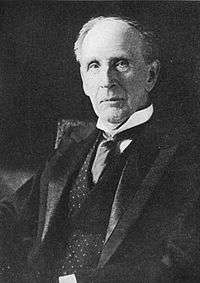
In 1937, the India Office was reorganised which separated Burma and Aden under a new Burma Office, but the same Secretary of State headed both Departments and a new title was established as His Majesty's Principal Secretary of State for India and Burma. The India Office and its Secretary of State were abolished in August 1947, when the United Kingdom granted independence in the Indian Independence Act, which created two new independent dominions, India and Pakistan. Burma soon achieved independence separately in early 1948.
Secretaries of State for India, 1858–1937
Prior to the establishment of the British Empire on 2 August 1858, Lord Stanley had served as President of the Board of Control.
| Portrait | Name | Term of office | Political party | Prime Minister | |||
|---|---|---|---|---|---|---|---|
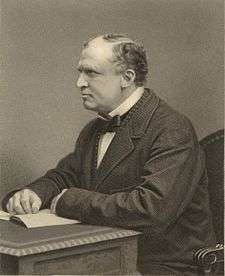 |
The Right Honourable Lord Stanley MP for King's Lynn |
2 August 1858 |
11 June 1859 |
Conservative | The 14th Earl of Derby | ||
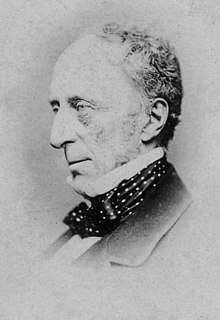 |
The Right Honourable Sir Charles Wood Bt GCB PC MP for Halifax until 1865 MP for Ripon after 1865 |
18 June 1859 |
16 February 1866[1] |
Liberal | Viscount Palmerston | ||
| The Earl Russell | |||||||
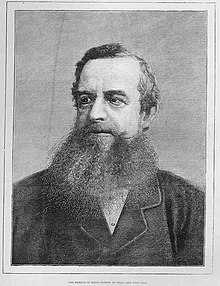 |
The Right Honourable The Earl de Grey VD PC |
16 February 1866 |
26 June 1866 |
Liberal | |||
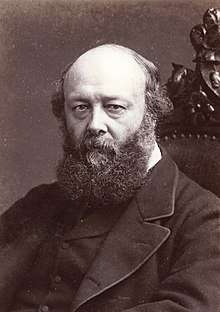 |
The Right Honourable Viscount Cranborne MP for Stamford |
6 July 1866 |
8 March 1867 |
Conservative | The 14th Earl of Derby | ||
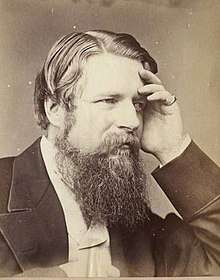 |
The Right Honourable Sir Stafford Northcote Bt CB MP for North Devonshire |
8 March 1867 |
1 December 1868 |
Conservative | |||
| Benjamin Disraeli | |||||||
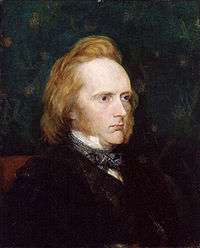 |
His Grace The Duke of Argyll KT PC |
9 December 1868 |
17 February 1874 |
Liberal | William Ewart Gladstone | ||
 |
The Most Honourable The Marquess of Salisbury PC FRS |
21 February 1874 |
2 April 1878 |
Conservative | Benjamin Disraeli | ||
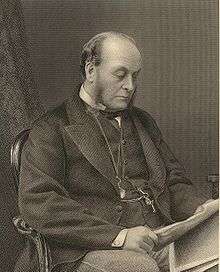 |
The Right Honourable The Viscount Cranbrook PC |
2 April 1878 |
21 April 1880 |
Conservative | |||
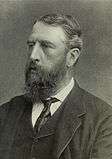 |
The Most Honourable Marquess of Hartington MP for North East Lancashire |
28 April 1880 |
16 December 1882 |
Liberal | William Ewart Gladstone | ||
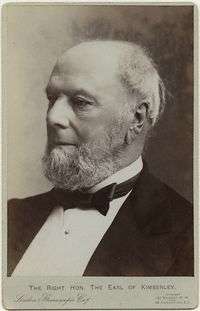 |
The Right Honourable The Earl of Kimberley PC |
16 December 1882 |
9 June 1885 |
Liberal | |||
 |
The Right Honourable Lord Randolph Churchill MP for Paddington South |
24 June 1885 |
28 January 1886 |
Conservative | The Marquess of Salisbury | ||
 |
The Right Honourable The Earl of Kimberley KG PC |
6 February 1886 |
20 July 1886 |
Liberal | William Ewart Gladstone | ||
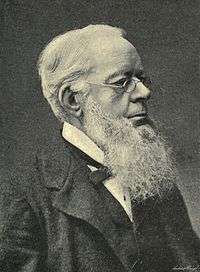 |
The Right Honourable The Viscount Cross GCB PC |
3 August 1886 |
11 August 1892 |
Conservative | The Marquess of Salisbury | ||
 |
The Right Honourable The Earl of Kimberley KG PC |
18 August 1892 |
10 March 1894 |
Liberal | William Ewart Gladstone | ||
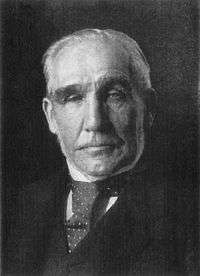 |
The Right Honourable Henry Fowler MP for Wolverhampton East |
10 March 1894 |
21 June 1895 |
Liberal | The Earl of Rosebery | ||
| The Right Honourable Lord George Hamilton MP for Ealing |
4 July 1895 |
9 October 1903[2] |
Conservative | The Marquess of Salisbury (Unionist Coalition) | |||
| Arthur Balfour (Unionist Coalition) | |||||||
| The Right Honourable William St John Brodrick MP for Guildford |
9 October 1903 |
4 December 1905 |
Irish Unionist | ||||
 |
The Right Honourable John Morley OM PC MP for Montrose Burghs until 1908 Viscount Morley of Blackburn after 1908 |
10 December 1905 |
3 November 1910 |
Liberal | Sir Henry Campbell-Bannerman | ||
| H. H. Asquith | |||||||
 |
The Right Honourable The Earl of Crewe KG PC FSA |
3 November 1910 |
7 March 1911 |
Liberal | |||
 |
The Right Honourable The Viscount Morley of Blackburn OM PC |
7 March 1911 |
25 May 1911 |
Liberal | |||
 |
The Most Honourable The Marquess of Crewe KG PC FSA |
25 May 1911 |
25 May 1915 |
Liberal | |||
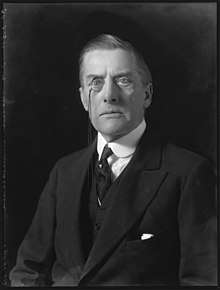 |
The Right Honourable Austen Chamberlain MP for Birmingham West |
25 May 1915 |
17 July 1917[3] |
Conservative | H. H. Asquith (Coalition) | ||
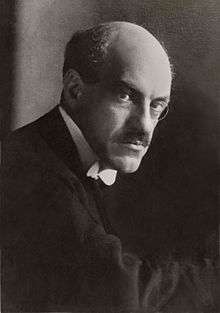 |
The Right Honourable Edwin Montagu MP for Chesterton until 1918 MP for Cambridgeshire after 1918 |
17 July 1917 |
19 March 1922 |
Liberal | |||
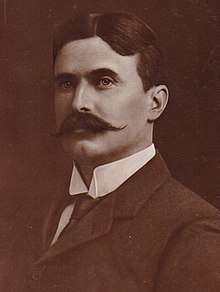 |
The Right Honourable The Viscount Peel GBE PC |
19 March 1922 |
22 January 1924 |
Conservative | Bonar Law | ||
| Stanley Baldwin | |||||||
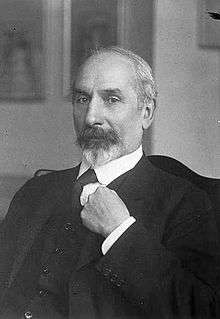 |
The Right Honourable The Lord Olivier KCMG CB PC |
22 January 1924 |
3 November 1924 |
Labour | Ramsay MacDonald | ||
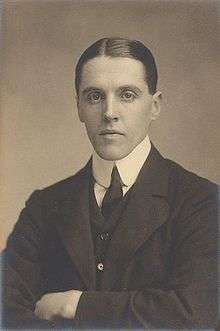 |
The Right Honourable The Earl of Birkenhead KCMG PC KC |
6 November 1924 |
18 October 1928 |
Conservative | Stanley Baldwin | ||
 |
The Right Honourable The Viscount Peel GBE PC |
18 October 1928 |
4 June 1929 |
Conservative | |||
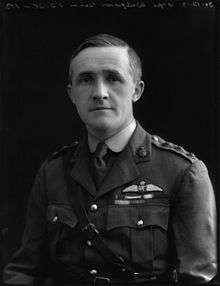 |
The Right Honourable William Wedgwood Benn DSO MP for Aberdeen North |
7 June 1929 |
24 August 1931 |
Labour | Ramsay MacDonald | ||
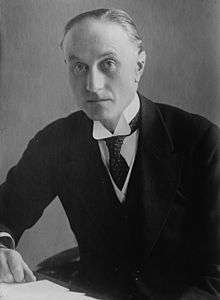 |
The Right Honourable Sir Samuel Hoare Bt GCSI GBE CMG JP MP for Chelsea |
25 August 1931 |
7 June 1935 |
Conservative | Ramsay MacDonald (1st & 2nd National Min.) | ||
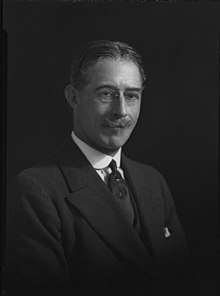 |
The Most Honourable The Marquess of Zetland GCSI GCIE PC |
7 June 1935 |
28 May 1937 |
Conservative | Stanley Baldwin (3rd National Min.) | ||
Secretaries of State for India and Burma, 1937–1947
| Portrait | Name | Term of office | Political party | Prime Minister | |||
|---|---|---|---|---|---|---|---|
 |
The Marquess of Zetland GCSI GCIE PC |
28 May 1937 |
13 May 1940 |
Conservative | Neville Chamberlain (4th National Min.; War Coalition) | ||
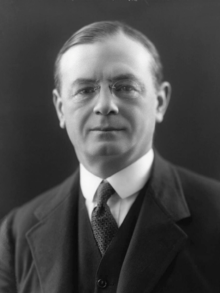 |
The Right Honourable Leo Amery MP for Birmingham Sparkbrook |
13 May 1940 |
26 July 1945 |
Conservative | Winston Churchill (War Coalition; Caretaker Min.) | ||
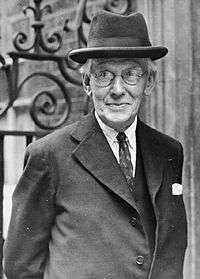 |
The Right Honourable The Lord Pethick-Lawrence PC |
3 August 1945 |
17 April 1947 |
Labour | Clement Attlee | ||
 |
The Right Honourable The Earl of Listowel PC |
14 August 1947 |
4 January 1948 |
Labour | |||
Secretaries of State for Burma, 1947–1948
| Portrait | Name | Term of office | Political party | Prime Minister | |||
|---|---|---|---|---|---|---|---|
 |
The Right Honourable The Earl of Listowel PC |
14 August 1947 |
4 January 1948 |
Labour | Clement Attlee | ||
See also
- India Office
- British Raj
- British rule in Burma
- Governor-General of India
- Imperial Civil Service
- Government of India Act
Notes
- Resigned after being injured in a hunting accident.
- Resigned.
- Resigned.
External links
| Wikimedia Commons has media related to Secretaries of State for India. |